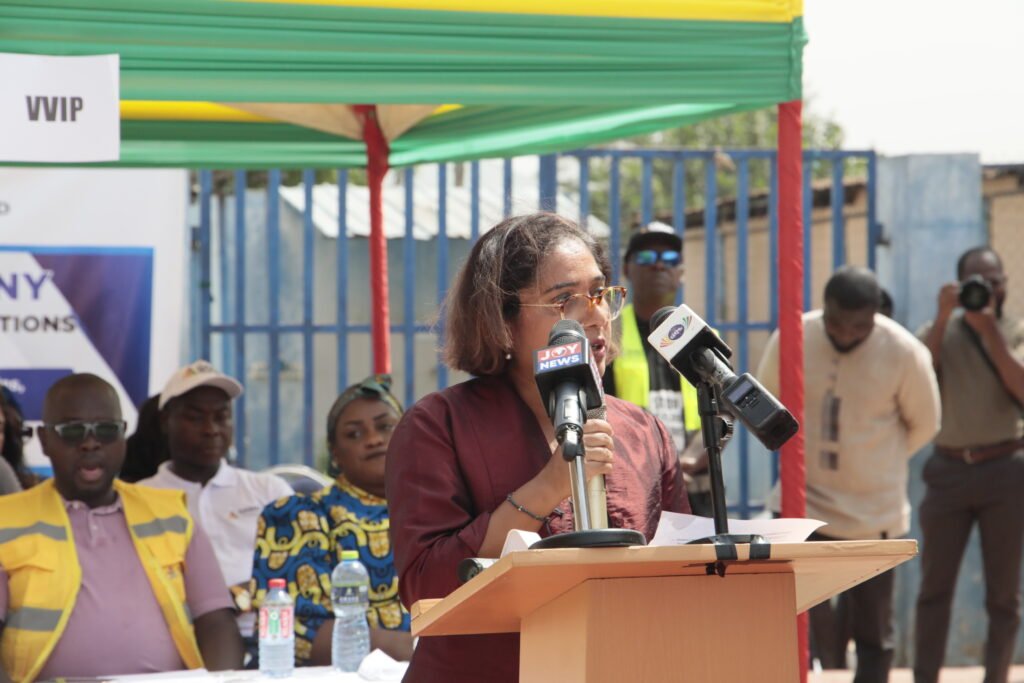
The Minister of Works and Housing, Mr. Francis Asenso-Boakye has cut sod for the commencement of community upgrading works in Alogboshie, a low-income settlement under the GARID Project.
Speaking at the event, Mr. Asenso-Boakye, said under the current phase of the GARID Project, the Ministry, will undertake the construction of primary and secondary drains, access roads, solid waste management facilities, and extend security lights and water supply networks in Alogboshie. He indicated that similar works are scheduled to commence in Akweteyman and Nima, two other low-income settlements benefiting from the project. These interventions, the Minister asserted will not only enhance public service provision but will also reduce the perennial flooding challenges faced by the communities.

The Honorable Minister also announced that the Ministry of Works and Housing in collaboration with the Ghana Hydrological Authority, the Water Resources Commission, the Ghana Meteorological Agency, and NADMO, through the GARID Project is establishing a Flood Early Warning System (FEWS) for the Greater Accra Region. According to him, the Early Warning System will provide advanced notification of impending floods to residents in flood-prone communities so they can take steps to protect their lives and properties ahead of the flood event.
“A variety of equipment to support the establishment of the Accra Flood Early Warning has been procured and will be handed over to these institutions later today,” said Mr. Asenso-Boakey. Mr. Asenso-Boakye appealed to Ghanaians to support government’s flood control measures by changing their behaviour towards solid waste disposal, choice of building locations and other climate-resilient flood mitigation measures. He stressed that the implementation of the GARID Project’s interventions and all other Government’s flood mitigation measures, will not succeed if such behaviour and underlying attitudes do not change.
“Let me reiterate that for flood mitigation to work in Accra and everywhere in this country; people must change and be more responsible in their choice of building sites and the manner they dispose of solid waste; Assemblies must work and strictly enforce building and sanitation regulations; and the media must help by using their platforms to help the Assemblies and other institutions make it painful for people to indulge in bad behaviour,” the Honourable Minister Said.
Madhu Raghunath, Manager for Urban, Resilience and Land Global Practice, World Bank, said the project is the first large scale World Bank Project in Ghana which aims at building resilience of Accra. She expressed hope that the Project will achieve its developmental goal and be replicated in other cities of the country.

The GARID Project Coordinator, Dr. Kwadwo Ohene Sarfoh, announced that under the GARID Project, the Ministry of Local Government, Decentralization, and Rural Development has disbursed over Ten Million Ghana Cedis (GHS 10,902,800.00) Operations and Maintenance Grant to all seventeen (17) GARID Project’s Municipal Assemblies in 2021 and 2022. He said the grant was used by the Assemblies for desilting priority secondary and tertiary drains within their jurisdictions, preparing drainage network maps, developing comprehensive asset registers, and acquiring crucial equipment to aid their drainage maintenance activities.

Dr. Sarfoh underscored the impact of the grant in curbing the incidence of flooding in Accra. “… the grant scheme has already started yielding positive results. The desilting exercise funded by these grants played a pivotal role in reducing incidents of flooding in Accra during the last rainy season.” He entreated the people of Alogboshie and other flood-prone low-income settlements under the GARID Project to cultivate a culture of maintenance for the new drains and solid waste management infrastructure that will be built in their respective communities.
